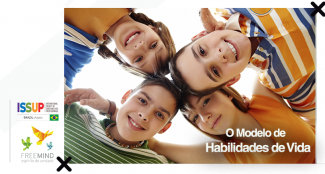The Life Skills Model

Life skills are capacities for positive adaptive behavior, which enable us to effectively negotiate the demands and challenges of everyday life. They involve personal skills that will enhance interpersonal relationships. The WHO suggests that programs be developed to reduce risk behaviors and increase physical and mental health care. Adolescents are a special population for these programs, due to their greater vulnerability.
The life skills model consists of favoring the development of a set of ten competencies, being grouped into categories that complement each other: social and interpersonal skills, cognitive skills, and skills to manage emotions. The proposed psychosocial skill set is as follows:
1. Self-knowledge: This skill can be understood as the search to perceive and recognize thoughts, feelings and behaviors in oneself in a realistic way, being fundamental in the development of adolescents. This skill relates to the knowledge and acceptance of our strengths and weaknesses, tastes and interests.
2. Empathy: It can be conceptualized as the ability to understand people, being able to understand what leads an individual to behave in a certain way. It is about not judging, but rather accepting difference, implying an action of solidarity and acceptance.
3. Effective communication: Ability to express oneself, verbally or not, in an appropriate way in various situations. Assertive communication is related to a set of thoughts, feelings, and actions that help young people achieve their personal goals in a socially acceptable way.
4. Interpersonal relationships: It is the ability to initiate, maintain relationships in a satisfactory way, which are important for our mental and social well-being, in addition to being able to end relationships in a constructive way.
5. Decision-making: This competence is understood by the ability to evaluate and deliberate on the consequences, risks and benefits that a situation may present, making it possible to choose the best alternative that provides a greater state of well-being, to the detriment of those that put the integrity of the individual at risk.
6. Problem solving: It is the ability to deal with situations that cause tension and/or conflict in a constructive way, using the resources of one's own environment without causing harm to others. This is an important competence, as it allows one to face life's problems constructively, since unresolved dilemmas can become sources of physical and mental discomfort.
7. Creative thinking: It is the individual's ability to seek viable alternatives, through flexibility of thought, in order to facilitate the management of different situations. It consists of the ability to use experience, the resources of the environment, and it is possible to manage the resources of one's own thought such as imagining, inventing, recreating and observing.
8. Critical thinking: It can be understood as the ability to reflect, analyze, and examine situations in personal and social life from different angles, perspectives, and opinions. This competence contributes in a certain way to the well-being of each one to the extent that it allows us to recognize the positive, negative, internal and external factors that influence our attitudes and behaviors, which increases the ability to assertively solve the difficulties encountered. The critical individual is able to ask questions and not accept events without developing a careful analysis in terms of evidence, reasons, and assumptions.
9. Dealing with feelings and emotions: This skill helps in recognizing emotions, perceiving their origin and identifying the way they influence behaviors, in addition to identifying better ways to express them.
10. Dealing with stress: This is the ability to recognize, evaluate possible sources of stress, found in different life scenarios, in addition to identifying possible alternatives to reduce them, such as making changes in relation to the environment or even linked to lifestyle. It also implies the ability to request help from family, friends and, if necessary, professional support, in an attempt to resolve situations that generate tension.
The teaching of life skills allows adolescents to have the opportunity to acquire new knowledge, in addition to directly influencing the formation of their values and attitudes.
Source:
http://pepsic.bvsalud.org/scielo.php?script=sci_arttext&pid=S1808-42812008000300009